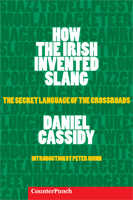 A few weeks ago, I heard Daniel Cassidy on the Last Word with Matt Cooper. It was a lively interview, and Cassidy’s premise – that many American slang words originate from the Irish language – was an intriguing one.
A few weeks ago, I heard Daniel Cassidy on the Last Word with Matt Cooper. It was a lively interview, and Cassidy’s premise – that many American slang words originate from the Irish language – was an intriguing one.
I ordered the book, and it’s arrived. It’s more scholarly that I would have expected from the interview (turns out that Cassidy is a professor and founder of the New College of California), and the historical as well as etymological background is well-drawn. What’s really astonishing is that so few words in English dictionaries are credited to Irish (most of Cassidy’s English words are listed “origin unknown,” and when you think about the huge diaspora, it’s a certainty that the Irish would have contributed words to English.
Some examples from the book:
- Baloney – Béal Ánna, meaning silly, foolish talk
- Boss – Bás, meaning boss, best, very good
- Brag – Bréag, meaning a lie, exaggeration, deception
- Cop – Ceap, meaning a protector or chief. The verb “ceap” has meanings including to catch or intercept.
- Daddy – Daidí
- Gab – Gab, a chattering mouth
- Goon – Guan
- Hick – Aitheach, meaning a peasant, a churl
- Jazz – Teas, meaning heat, passion, excitement
- Lucre – Luach Áir, meaning reward of gold
- Shack – Teach, meaning house
- Shanty – Seantigh, meaning old house
- Slob – Slab, meaning mud or a dirty or slovenly person
- Smashing – ‘s maith sin, meaning “it is good”
- So long – Slán
There are many more, and I highly suggest the book. At the very least it’s bound to lead to some interesting conversations!
Technorati tags: book, Irish, slang, word, Daniel Cassidy












I’m a southern american with a deep accent, and I am amazed at how much our speech is derived from Irish slang.
Of course, when I look at some of the pictures you take, I feel like I could be looking at places around here (here being East Tennessee).
Thanks, Darlene! A lot of the music down your way also has Irish influence. There was a great TV program on that subject by a couple who live here called “Bringing it all back home.” It won an Emmy, I believe…
Some of these seem pretty far fetched to me… Lucre particularly seems wrong. The word, as well as its cousin lucrative, comes from Latin: “Lucrum” meaning avarice, material gain, or profit. I’m sure some of those words have an Irish origin, but while Cassidy is a professor of Irish Studies, he is not a linguist, and I doubt a linguist has checked out his guesses — and since he has absolutely no evidence besides some phonetic similarity for many of these guesses, he is generally regarded as a bit of Left Coast loopiness by lexicographers and etymologists.
Thanks for that, Tina! There are some even more far-fetched examples, but still the evidence that some of the words come from Irish is compelling…
You know for years I was taught that many of these terms started out in African American communities. Sometimes word origins are difficult to determine. For example, I speak a fair amount of Russian and figured that some American slang terms almost had to be brought in by Russian immigrants. For example the Russian word “Dorok” means fools. But then I saw several other plausible origins for the work “Dork”.
On the other hand, it would be pretty remarkable if the famine immigrants left absolutely no influence on the English language.
Words such as “lucre” were introduced into Ireland by the Norman French. The very familiar Irish “bally” prefix is, etymologically “villa.”
African slaves would obviously have learned their English from whites. Need I point out that many Irish were transported to the colonies for crimes or indentured and worked alongside Africans? Unlike Africans, the Irish had no value as indentured or criminal. Blacks would have learned a quaint 17th century Hiberno-English and the reverse I’m sure.
This list is bogus rubbish. The Irish words all either don’t mean what it says or don’t actually exist or are gaelicised versions of English words; and the English words all have recognised etymological origins other then what this post states.
The only example on this list which is accurate is:
Smashing – ‘s maith sin, meaning “it is good”